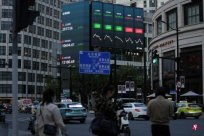
(Beijing Comprehensive News) Affected by the continuous downturn real estate, weak economic data, and the latest financial industry default incidents, global investors are selling Chinese assets in large quantities, and many foreign investment banks have lowered the forecast of economic growth in China in 2023.
According to Reuters, a report released by Goldman Sachs on Tuesday (August 15) states that the global hedge fund has sold Chinese stocks in eight trading days in the past 10 trading days, of which A shares have led the decline and accounted for accounting60%of the total selling.This is one of the largest net sales of Chinese stocks in any 10 days since October 2022, and it is also one of the largest net sales in the past five years.
Reports did not mention the sales of hedge funds worldwide, but the northbound capital sold 4.639 billion yuan (S $ 871 million) on August 16th; in the past week, more than 25.5 billion yuan in funds in the northEssenceNorthbound capital is the capital of international capital to buy stocks in mainland China through the Hong Kong Exchange.
At the same time, the MSCI China Index (MSCI China Index), which evaluates the benchmark of China's assets, has a decrease of 1.3%on Wednesday (August 16).Bloomberg expects that the index may vomit the increase since the Politburo of the Communist Party of China on July 24, and pointed out that as the sales of Chinese assets rising, the Chinese market is close to the severe milestone.
The poor performance of the capital market reflects China's weak economic data, the downturn in the real estate industry, and the financial risks of the water surface, which has deepened global investors' concerns about China's economic prospects.
The latest data from the National Bureau of Statistics of China shows that the growth rate of key indicators such as consumer expenditure, industrial added value and investment activities in July declined across the board.
Real estate is even more unsatisfactory.According to July Real Estate data released by the Bureau of Statistics on Wednesday (August 16), the average price of new houses in 70 cities in China decreased by 0.1%year -on -year and a decrease of 0.2%month -on -month., And the decline expanded.July is also the least one month of real estate investment this year, and a month -on -month decrease of 28.7%.
The defaulted incident of the trust giant of China ’s largest asset management company, China, China, has also exacerbated investors' concerns about the spread of financial risks.
Trust companies are an important part of shadow banks composed of non -bank loan institutions in China. In the past, they have been questioned that they have invested too much on real estate.According to Reuters, the size of China's $ 3 trillion (S $ 4.07 trillion) (S $ 4.07 trillion) is equivalent to the British economy, and there are many trust products investors. If Beijing does not take support measures, the breach of contract will further crack down on fragile.Market confidence.
reduce GDP expectations
The bad news about the Chinese economy continued, and many foreign banks have reduced the expectations of China's growth in 2023.Morgan Chase predicted that China ’s GDP’ s growth rate (GDP) growth rate in 2023 was reduced to 4.8%in 2023.In early May, the bank also predicted that the Chinese economy would increase by 6.4%, which was one of the most optimistic institutions.
Barclays reduced China's GDP growth forecast of this year by 0.4 percentage points to 4.5%, while maintaining growth expectations in 2024 to 4%below consensus.The reasons given by the bank's economists are: consumption, real estate, export and credit data are generally disappointing, and lack of effective and effective financial and consumer stimulus measures.
Bloomberg said that if it is expected by economists above, it will be the first three consecutive years of GDP growth rates in China for the first time since the Mao Zedong era.In 2023, China's official economic growth goal was 5%, which was the lowest number since China began to set the target of economic growth in 1994.
Morgan Stanley did not decrease expectations, but its chief Chinese economist said that if the policy of loose policies is slow, China's 5%economic growth goal may not be achieved.




